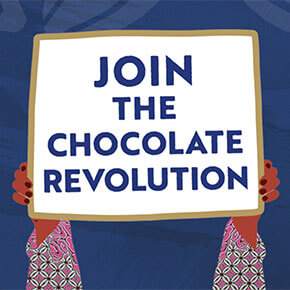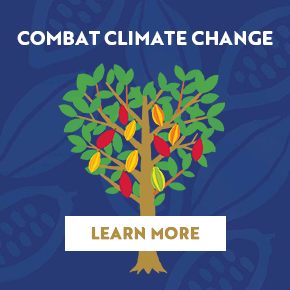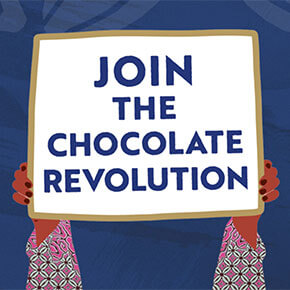Kenema is a major diamond trading centre and also home to some of the country's cocoa trading enterprises. Sierra Leone has a liberalised economy - so anyone can trade and export cocoa.
It's here we meet Ibrahim Moseray - the charismatic general manager of Kpeya Agricultural Enterprise (KAE). He, like all his fellow cocoa farmers, experienced firsthand the terror of the civil war that waged in the country throughout the 90's, and lost family, friends and the ability to work his farm. Despite the terrible circumstances, Ibrahim nurtured his idea that farmers should run their own cocoa buying and trading business, and liaised with NGOs on the ground and his farmer colleagues to help bring his idea to fruition.
KAE was first established in 1996, and Ibraham persevered with persuading farmers to come on board. KAE has over 1,200 members from 50 villages and has made great strides in creating a working, vibrant cooperative and the farmers are starting to see the tangible benefits of doing things for themselves.
Key to their progress has been the input from Twin, and in turn the help and technical advice from Kuapa Kokoo, the Ghanaian cooperative behind Divine Chocolate. They have helped on organisational issues, helped them improve the quality of their cocoa, and helped them receive Fairtrade certification. Ibrahim guides us to KAE's new offices on the edge of town and we join all his management team in singing an introduction song - where everyone sings a verse including their own name.
The team, a mix of men and women, young and old were all equally energised and enthusiastic about the organisation they were creating. The Chairman, Sellau Momoh, was born in 1933 and remembered the British encouraging Sierre Leone to plant more cocoa when he was young.
We sat and talked about the challenges facing the KAE. In Sierra Leone there is only one harvest a year and in between, during the summer months is the 'hunger season' - when there is next to no income for buying food. The staple food is rice - and the farmers do grow some of their own - but the local market is undermined by subsidised imports.
Farmers have become dependent on being pre-paid for their cocoa with rice - and then not being paid enough on delivering their cocoa to feed their families for the rest of the year. It's a cycle KAE hopes to break - ultimately ending up with farmers producing more, higher quality cocoa, and being paid a good price when they harvest their cocoa so the income takes them through the hunger season. Other cocoa traders have responded to KAE's recruitment of farmer members and offered a range of short term incentives to lure them away. But both a good price for the cocoa and the growing number of other benefits they can see - a new school, a new truck, a new depot - are starting to keep members loyal to KAE.
The next day we set off to Batiama, a small village two hours out of Kenema, along some challenging roads and tracks. We arrive to a reception of KAE members and once again the 'introduction song' gets everyone laughing.
This is a significant occasion. My mission is to represent Divine Chocolate and explain how their fellow farmers in Ghana, Kuapa Kokoo, agreed to KAE selling their first container of Fairtrade cocoa to Divine, thereby forgoing the premium they would get for the same amount of cocoa. I explain that Kuapa Kokoo was once small like KAE – but over 17 years it has grown and thrived – and it also established its own chocolate company – something to consider for the future! It makes sense for Kuapa to help other farmers sell to Divine – as they still receive their share of the profits.
KAE’s first premium was spent, with the agreement of the members, on buying land for the first proper KAE offices and storeroom which have now been built. It has made the company seem even more tangible – the farmers can see it really is established, professional and in business.
The farmers gathered in Batiama were very interested to hear more about Kuapa Kokoo, but were more focused on the fact that the very chocolate that now contains their first Fairtrade cocoa is in a coolbag next to me. A major tasting session follows – thankfully there’s enough for every single adult and child (with enough left over for Ibrahim to impress his bank manager). We visited two farms and heard the stories of how they had to abandon the farms when the rebels came to their village. Most of the farmers had to flee and came back to the village years later. It took five years to get the cocoa trees back in good condition again and a lot of work needed to be done on planting new trees and pruning the existing ones to improve production.
The farmers are very proud of their new skills to produce better quality cocoa – they have learnt about fermentation and slow drying and now have quality testing equipment. Like Kuapa, they vote for the key KAE representatives in every village and they are seeing the benefit of having their voices heard. Batiama has built its own small school and paid for a teacher to come out to them so now the children no longer walk four miles to school and back each day. Everyone has harrowing stories but there seems to be a sense of determination and optimism – if we went through that, we can get through anything.
56 year old Swaray Salia says:
“Our biggest challenge is getting good money at the right time – and ensuring we have enough to eat through the Hunger Season. We need to work hard on weed control in between harvests and we need food to give us the energy to do it. Cocoa is our only source of income. Since I joined KAE we have been able to build houses for ourselves – I now have my own house. Kpeya had the idea of building a school here in this village so the children didn’t have to walk four miles to school any more. It opened this year. Our water supply is from the river. I hope one day we can earn enough Fairtrade premium to have our own well. My personal dream is to ensure all my children go to school. One of my sons wants to be a cocoa farmer, so the farm will go to him. My message to the people who love chocolate: As we are now exporting our cocoa please help us – and stretch your hands out to us. Let there be communication between the people who eat chocolate and the farmers here. We are simple people and need your support, so our children can be educated. We sometimes go hungry – and we need our cocoa to give us a sustainable income. Two sacks of cocoa is not enough to send one child to school.”





